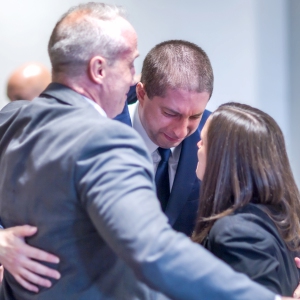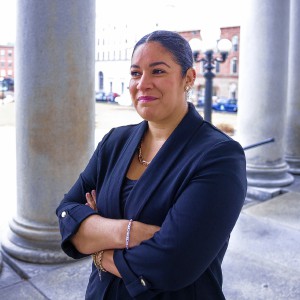New Hampshire House considers bill to call gender reassignment surgeries child abuse
| Published: 02-03-2021 5:15 PM |
For Alison Breault, the hormone treatment for her son wasn’t just a medical procedure. It was a new beginning.
As a teenager, Breault’s son, who was assigned female at birth, had self mutilated and contemplated suicide, uncomfortable with his birth sex and unhappy with his inability to immediately change it.
Breault accepted her child’s gender identity, and soon he was on a hormone blocker, a reversible treatment that blocks menstruation
“Soon, hopefully, he’ll be starting testosterone, which has made him so happy,” she said at a House hearing Wednesday.
Breault spoke at a time when the processes for sex reassignment therapy for transgender people has become more widespread – across the country and in New Hampshire. Major insurance carriers cover the procedures, which can range from hormonal therapy to surgery. Since 2017, the state Medicaid plan now covers it, too.
But this year, one effort in the New Hampshire House is challenging that shift. A Franklin representative has brought forward a bill to categorize sex reassignment surgeries and treatments performed on minors as child abuse.
In a bill presented to the House Children and Family Law Committee, Rep. Dave Testerman, a Republican, has proposed changing the definition of abuse of a child to include sex reassignment surgery on minors.
The bill, House Bill 68, would consider any child “subjected to drug treatments or surgery in an attempt to alter the sex of the child assigned at birth” to be an “abused child” in the eyes of the law.
Article continues after...
Yesterday's Most Read Articles
 Bill to allow ‘no fault’ evictions makes it to governor’s desk
Bill to allow ‘no fault’ evictions makes it to governor’s desk
 ‘He’s coming home’: Jury acquits former prison guard Matthew Millar in murder trial
‘He’s coming home’: Jury acquits former prison guard Matthew Millar in murder trial
 Look, up in the sky! It’s… an Airstream trailer?
Look, up in the sky! It’s… an Airstream trailer?
 Around Concord: Living in an 1856 schoolhouse is (mostly) delightful
Around Concord: Living in an 1856 schoolhouse is (mostly) delightful
 Slots and no bet limits: State budget shakes up New Hampshire’s casino landscape
Slots and no bet limits: State budget shakes up New Hampshire’s casino landscape
 ‘Deep flavor’ – New restaurant in downtown Concord offers creative spin on comfort food and cocktails
‘Deep flavor’ – New restaurant in downtown Concord offers creative spin on comfort food and cocktails
“I don’t care how parents want to dress their kids, how they want to address their kids,” Testerman said. “Things like that – not my business to get into. As the bill says, I’m just talking about drugs and operations for surgery.”
The legislation is sparsely worded, but Testerman said that it would subject pediatricians who carry out the procedures to child abuse laws. And it would make parents who requested it for their children liable themselves, and could open the family up to an investigation by the Division for Children, Youth and Families.
Testerman argued the bill was necessary because puberty blockers and other hormone therapies can have harmful side effects. And he arghued that providing the treatments to trans teens with gender dysphoria – a condition caused by feelings of being identified by others by the wrong gender – would not reduce suicidal ideations.
“It clearly makes a physical change, either through drugs or through surgery, that just makes no sense to do,” he said. “Would you cut off an index finger because a little boy points and uses it as a gun? It just doesn’t make any sense.”
Responding to a question by a committee member, Testerman akwowleged that he holds no medical degree. But, he added: “I have four children and 12 grand children. So I know a little bit about them.”
Testerman left the hearing before other members of the public could weigh in. Breault and others pushed back at his characterizations.
“I really wish that Rep. Testerman could be here to hear these things,” Breault said. “I’m happy that he has kids and that he’s never had to experience the hardship of a child wanting to kill themselves. And maybe if he had, he’d have a slight bit of empathy for this. But I’m pleading with this House to not pass this, to vote no, and to show all the youth in our state and in our country that we want the best for them, that we love them, and that we support them.”
Christine Arsnow, a pediatrician at Concord Hospital and the vice president of the New Hampshire Pediatric Society, said that the procedures are well established in the medical community, and that the sex reassignment therapy starts gradually and with full consent of the teenager.
The process follows guidelines and starts with evaluations of children with gender dysphoria, starting with “socially transitioning” – identifying them by their preferred names and pronouns and allowing them to select their own clothing and hair styles. Medical treatment is used only after puberty, and only for some teens, Arsnow said.
“It can be hard to understand what it is like to have a transgender child, especially if you’ve never met someone who is transgender,” Arsnow said. “Parents of transgender children, like most parents, simply want to do what is best for their child. In addition to harming transgender youth, this bill would directly interfere in the physician-patient-family relationship and harm pediatricians and other medical professionals.”
The virtual hearing drew a long list of people Wednesday, with 69 people signed up to speak, chairwoman Rep. Kimberly Rice said. Under time constraints, the committee could hear from only a handful of participants before Rice had to adjourn it to a later date.
But one participant, Anya Tang, spoke forcefully, from a personal perspective. Tang, a transgender teenager, argued that opposing the bill was a matter of human rights.
About half of transgender children had considered suicide from 2019 to 2020, according to a sweeping national survey by the LGBTQ rights organization called the Trevor Project.
“When I was young, whenever I looked in the mirror I never ever saw a body or a face that I could call mine or feel comfortable with,” Tang said. “I have been trans for as long as I’ve been able to think and feel and move, and I can confirm: It’s not a phase.”
Tang added: “I oppose HB 68 because I believe that denying me the health care I need to feel safe and affirmed is abuse, in and of itself.”
]]>







 New Hampshire school phone ban could be among strictest in the country
New Hampshire school phone ban could be among strictest in the country Concord became a Housing Champion. Now, state lawmakers could eliminate the funding.
Concord became a Housing Champion. Now, state lawmakers could eliminate the funding. ‘A wild accusation’: House votes to nix Child Advocate after Rep. suggests legislative interference
‘A wild accusation’: House votes to nix Child Advocate after Rep. suggests legislative interference  Sununu decides he won’t run for Senate despite praise from Trump
Sununu decides he won’t run for Senate despite praise from Trump
